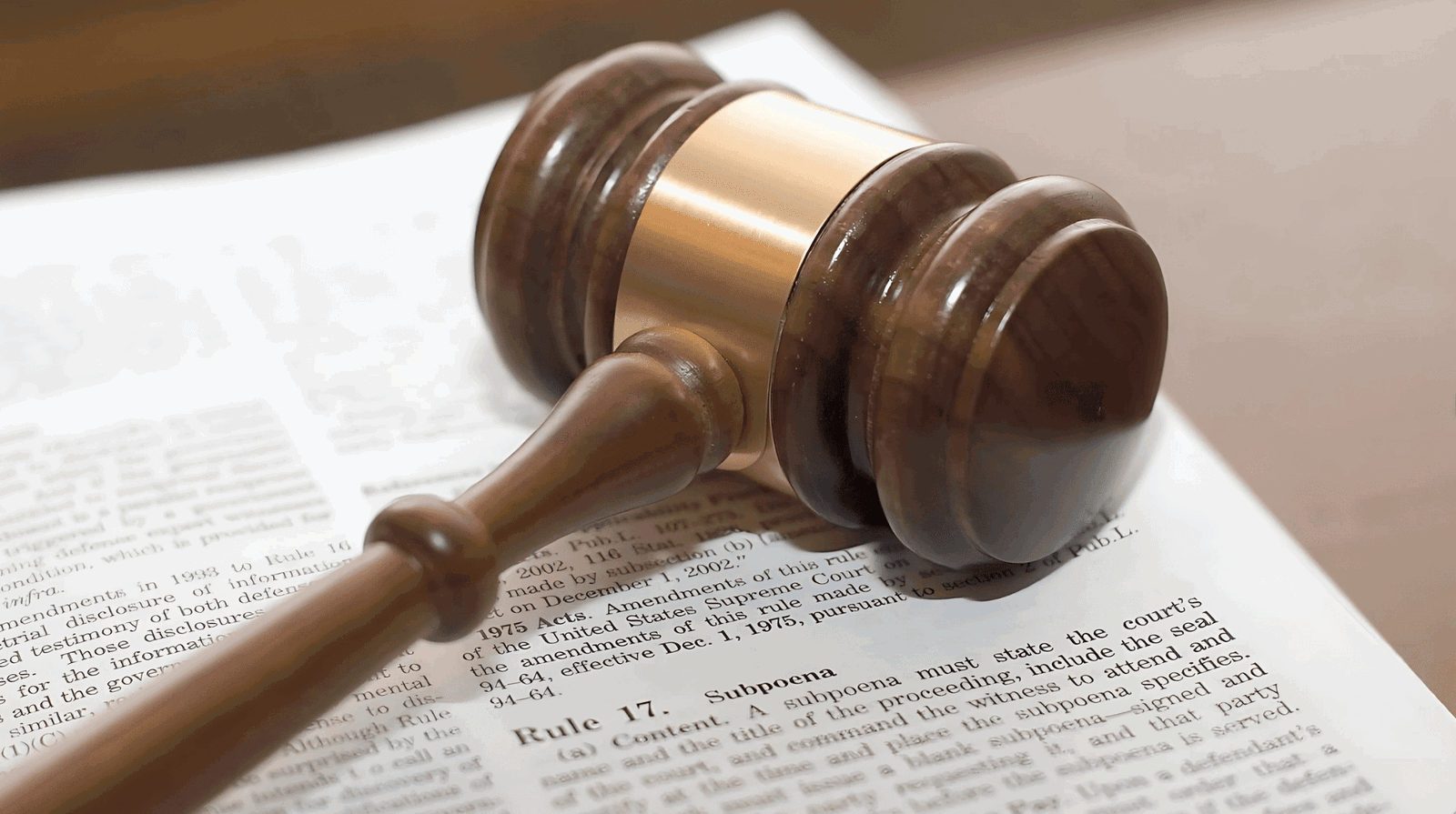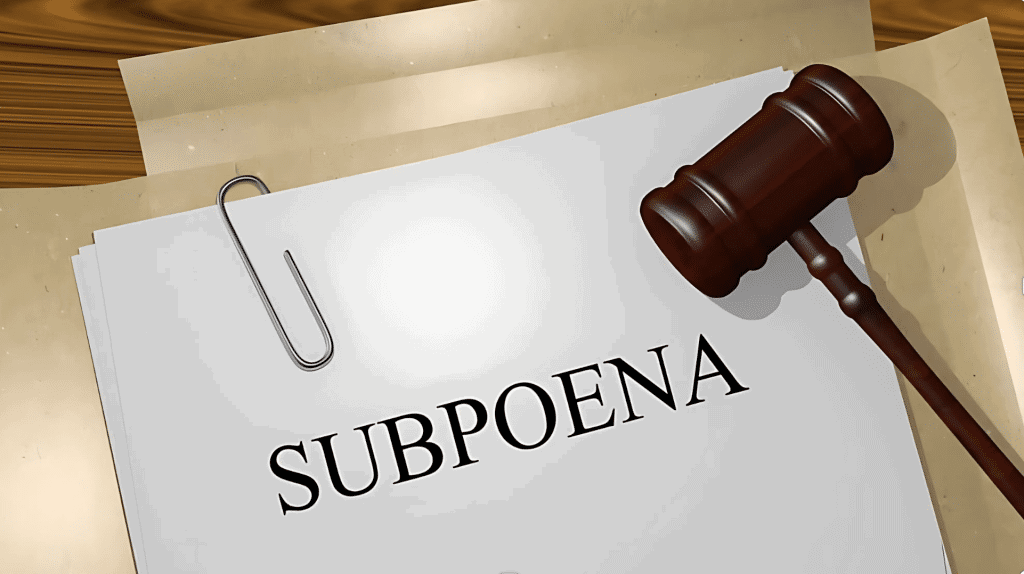Imagine getting a formal letter that makes your heart race. That’s often how people feel when they receive a subpoena. This legal document can seem scary, but understanding it is key.
A subpoena is simply an order to appear in court or provide information. It’s a common part of the legal process and is used in civil and criminal cases.
Knowing what a subpoena means and how to respond can help ease your worries.
This guide will explain the basics of subpoenas, their different types, and what to do if you get one. By the end, you’ll have a clearer picture of this legal tool and feel more prepared to handle it.
Let’s plunge into the world of subpoenas and demystify this important legal document.
What is a Subpoena?
A subpoena is a formal order from a court requiring you to do something. It’s like a letter saying, “Hey, we need your help with a legal matter.”
This paper asks you to show up in court or give some information. Courts use subpoenas to get the facts they need for cases.
Think of it as the court’s saying, “We think you know something important, and we’d like you to share it with us.” It’s a key tool that helps courts determine what happened in a case.
Immediate Implications of Receiving a Subpoena

Getting a subpoena can make you nervous, but don’t worry—it’s not always bad news.
The main thing to remember is that you can’t just ignore it. If you do, you might get in trouble with the court. They could fine you or even say you’re not following their rules.
The subpoena will tell you what you need to do. You might have to go to court and talk about what you know. Or you might need to send some papers or other stuff to the court.
It’s important to read the subpoena carefully and do what it asks.
Types of Subpoenas
There are three main types of subpoenas: witness subpoenas, subpoenas duces tecum, and deposition subpoenas. Each one asks you to do something different for a legal case. Let’s look at what each type means for you.
1. Witness Subpoena
A witness subpoena tells you to come to court and talk about what you know. It’s like being asked to tell your story to help the court determine what happened.
You’ll need to speak under oath, which means you promise to tell the truth. Your words can be very helpful in solving the case.
Remember, the court thinks you have important information, so they want to hear from you directly.
2. Subpoena Duces Tecum
This type of subpoena asks you to bring things to court. It might be papers, photos, or even computer files. The Latin words “duces tecum” mean “bring with you.”
So, you’re not just showing up – you’re bringing stuff that the court needs to see. This often happens before the trial starts, when both sides gather information.
3. Deposition Subpoena
A deposition subpoena is a bit different. It doesn’t always mean you have to go to court. Instead, you might tell your story in a lawyer’s office or elsewhere.
You’ll still be under oath, just like in court. You might also need to bring documents. This helps lawyers prepare for the trial by learning what they know beforehand.
Key Responsibilities and Rights
1. What You Must Do Upon Receiving a Subpoena
First things first, read the subpoena carefully. It’s like getting instructions for an important task. Look for dates when you need to go to court or when you should send in documents.
Make sure you understand what the subpoena is asking you to do. It might want you to bring certain papers or show up to talk about something you saw.
Whatever it asks, make sure you do it on time. If you don’t, you could get in trouble with the court. It’s like being late for a very important meeting – not a good idea!
2. Your Rights
Now, let’s talk about your rights. You’re not alone in this. You can speak to a lawyer to help you understand the subpoena better.
It’s like having a guide to explain what’s going on. If you think the subpoena is asking for too much or something private, you can question it.
For example, if it wants you to bring tons of papers that would take weeks to gather, you might be able to say that’s too much work.
Or if it asks about things you discussed with your doctor, you might not have to share that.
Remember, you can ask questions and get help understanding what’s happening.
Consequences of Ignoring a Subpoena
If you ignore a subpoena, you’re putting yourself at risk for legal and financial trouble. It’s not something that will disappear if you avoid it. Below are the key consequences you could face if you don’t comply with a subpoena:
| Consequence | Description |
|---|---|
| Legal Repercussions |
|
| Additional Costs |
|
Who Can Issue a Subpoena?

Judges and Magistrates: These courtroom leaders can issue subpoenas during cases. They use them to obtain information that helps them better understand the case.
Attorneys: Lawyers can send subpoenas for their clients. They use them to get people to talk in court or ask for important papers to help their case.
Clerks of Court and Administrative Agencies: Court clerks can sometimes issue subpoenas, like for jury duty. Some government agencies can also send them when they investigate something.
No matter who sends it, a subpoena is an official request you should take seriously.
How to Comply with a Subpoena
1. Steps to Compliance
First, read the subpoena carefully. If it tells you to go to court, ensure you arrive on the right day and time.
It’s like having an important appointment you can’t miss. If the subpoena asks for papers or other stuff, gather everything it wants.
Keep all these things neat and easy to find. This way, you can give the court exactly what they need without fuss.
2. Challenging a Subpoena
Sometimes, you might think the subpoena asks for too much or the wrong things. If that happens, you can try to challenge it.
This means asking the court to change or cancel the subpoena. But be careful – you need a good reason to do this. It’s smart to talk to a lawyer before challenging a subpoena.
They can tell you if you have a good case and help you do it correctly.
Wrapping It Up
Now that you know what a subpoena is and how to handle it, you’re better prepared if one comes your way.
Remember, a subpoena is a legal tool to gather information, not a sign that you’re in trouble. The key takeaways? Read the subpoena carefully, follow its instructions, and don’t ignore it.
If you’re unsure about anything, it’s okay to ask for help from a lawyer.
Your role is important in the legal process, whether testifying in court, providing documents, or participating in a deposition.
Understanding your rights and responsibilities will help you navigate this situation confidently. Have you ever received a subpoena? How did you handle it?
Share your experiences in the comments below – your story might help others facing similar situations.





















